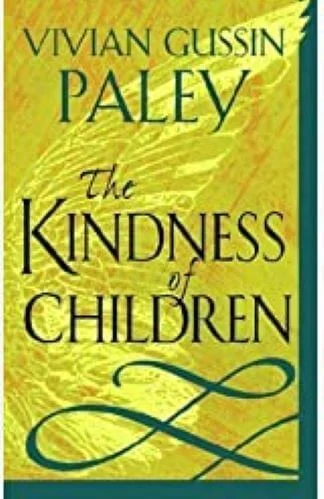
The Kindness of Children
by Vivian Gussin Paley
Review by Jane Paley
Jane Poremski Paley, is an RN, working to accredit homecare agencies. She was Vivian’s daughter-in-law for 28 years. ‘There was nothing I wouldn’t do for her, she was always there for me.’
Book No: 10 – 1st published: 1999
A whole world of acceptance and belonging opens for the ‘stranger’ and the ‘home-born’ alike, each time there is a connection made between two children, an act of kindness is given. Hence the moral universe at the heart of kindness takes notice.
When I married Vivian’s son Robert, I had no idea that I would be the recipient of the gift of a mother-in-law who was positive and optimistic but also very kind. She seemed infinitely capable of finding the good in each person and situation. Bobby often remarked ‘she is half glass-full and only Mom could see it that way.’
Kindness was a characteristic innate to Vivian. She recognized kindness when she saw it in others but especially children. When she was in London to address school teachers, she visited a nursery school. It was there that she met Teddy, a wheelchair bound four-year old, strapped in and wearing a helmet to protect a bobbing head, uttering single words after twitching shoulders and flailing arms. He was welcomed and included in Storytelling and Story Acting by his fellow classmates, something she never forgot as the epitome of kindness. She recognized a story unfold before her eyes, the story that became the subject matter of her tenth book and the first book she wrote after retiring from forty-four years in the classroom.
Throughout the book she provides anecdotes of kindness from experiences with not only Teddy, but with children from nursery school to middle school. She also includes her own mother’s story of kindness shown by a classmate when she arrived in America at a very young age and was unable to speak English. Yetta, though she should have been in the 4th grade, was placed in the 1st grade because she spoke only Yiddish. Masha, a 4th grader, came every day to help Yetta, translating everything into Yiddish and then back into English. She did not have to do this but she wanted to, to help Yetta get into 4th grade. Yetta never forgot this big favor. Truly an act of kindness by Masha when it meant the most to Yetta: when she was vulnerable, alone, and very much an outsider in a new country, with a new language, and in a new school. Vivian could think of only one person when it came to the dedication of this book: Yetta Meisel Gussin.
Vivian’s insights about children’s thinking and feeling flow from her years as master teacher and writer. She begins with the fundamental principle of treating all children kindly, no matter the behavior, because a teacher never knows whether you have before you a future president, attorney, nurse, or doctor.
If you invest in their goodness, you invest in their future.
At another time she acted out this principle with a fellow teacher when they agreed not to establish titles for children in the classroom such as ‘the bright one,’ ‘the smart one,’ ;the slow learner,’ ‘the argumentative one.’ If she did so, she would blur and limit her image of the child with her own interpretations, rather than allowing children to represent themselves in their own voice, stories and conversations.
There is a spiritual thread that winds through this book like none other. Vivian often resorted to her Jewish faith for inspiration, but here she related kindness to spirituality. She notes that children are eager to find evidence of goodness and love in their stories and in each other, and slough off the bad stuff. This she calls a spiritual event.
Basic themes of children’s play are: ‘someone is alone and a friend comes, someone is in trouble and help is on the way.’ Kindness means not allowing someone to feel left out, it means accepting and helping others to belong… a mitzvah. When she was a child, Vivian recalls a girl that she did not particularly like in her building. The girl would knock and ask Vivian to play. When Vivian said yes, her mother said in Yiddish, ‘you earned a mitzvah,’you have performed a true act of kindness.
The moral life of young and old are aptly illustrated in this book. Quiet moments of deep thoughtfulness help us to witness acts of goodness. Vivian in a beautiful way, relates her Teddy story to the old testament.
When God promises Abraham not to destroy the wicked cities of Sodom and Gomorrah if even ten righteous people can be found, how differently the biblical tale might have ended had Abraham searched in Teddy’s classroom.











